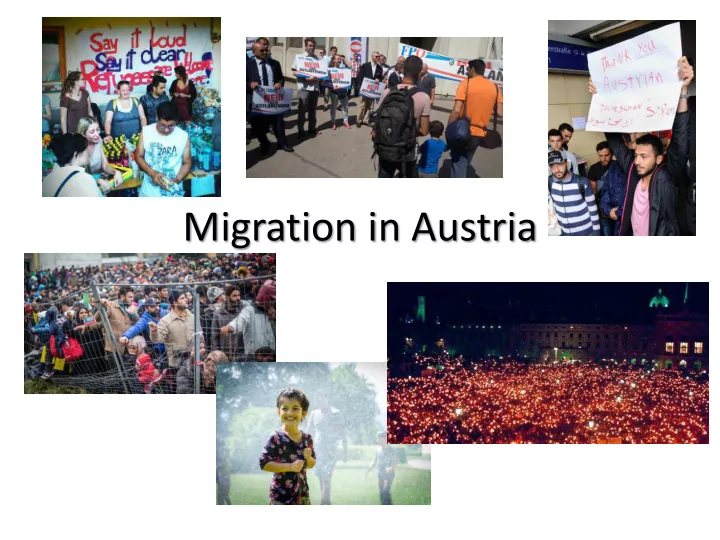

Migration in Austria
Refugees From the CSSR 1968 (Prague Spring)
Prague Spring
Antonin Novotny Alexander Dubček
Refugees From Ex-Yugoslavia in the 1990s
Refugees from the former Yugoslavia • ethnic conflicts fought from 1991 to 2003 • including: – Ten-Day-War in Slovenia (1991) – Croatian War of Independence (1991 – 1995) – Bosnian War (1992 – 1995) – Kosovo War (1998 – 1999) • wars accompanied the breakup of the country • successor states: Bosnia and Herzegovina, Croatia, Kosovo, Macedonia, Montenegro, Slovenia, Serbia
Refugees from the former Yugoslavia • ethnic conflicts fought from 1991 to 2003 • including: – Ten-Day-War in Slovenia (1991) – Croatian War of Independence (1991 – 1995) – Bosnian War (1992 – 1995) – Kosovo War (1998 – 1999) • wars accompanied the breakup of the country • successor states: Bosnia and Herzegovina, Croatia, Kosovo, Macedonia, Montenegro, Slovenia, Serbia
• Europe's deadliest conflict since World War II • 115,000 refugees in Austria – 13.000 refugees from Croatia – 90.000 refugees from Bosnia and Herzegovina – 12.000 refugees from Kosovo • Austria became second country, with the most refugees from Ex-Yugoslavia
Refugees After the fall of the Iron Curtain 1989/90 Magbulje Murati and Mina Yousefzai
Iron Curtain formed a imaginary boundary o Eastern Europe and parts of Central Europe found themselves under the o hegemony of the Soviet Union Between 1945 and 1949 the Soviets converted the following areas into o Soviet satellite states: • The German Democratic Republic • The People's Republic of Bulgaria • The People's Republic of Poland • The People's Republic of Hungary • The Czechoslovak Socialist Republic • The People's Republic of Romania • The People's Republic of Albania April 1989: People's Republic of Poland legalised the Solidarity o organisation anti-communist candidates won a striking o
19 August 1989, more than 600 East Germans attending the "Pan- o European Picnic" Hungarian border guards had threatened to shoot anyone crossing the o border mass protests in East Germany and the relaxing of border restrictions in o Czechoslovakia the Romanian military sided with protesters and turned on Communist o ruler Nicolae Ceauşescu a new package of regulations went into effect on 3 July 1990 o hundreds of Albanian citizens gathered around foreign embassies to seek o political asylum and flee from the country the inter-German border had become effectively meaningless o In July 1990, the day East Germany adopted the West German currency o
Foreign workers „Gastarbeiter“ In the 1960s Vanovac Tamara, Puljic Nikolina
• •
• • •
Recommend
More recommend